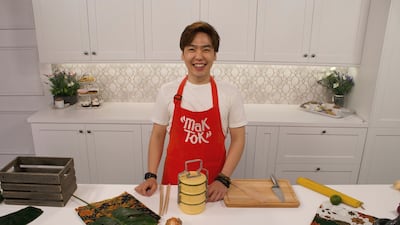When Will Chew moved to the UK more than 10 years ago, sapid memories of his mother's cooking from their busy kitchen in Malaysia stuck with him. Harnessing everything he learnt from her, Chew lost no time in recreating her dishes at his home in Sheffield.
“When you move far away from your family, food is definitely one of the first things you miss,” he says. “I needed to make something that my mom used to make, as I couldn't really find it in shops at the time.”
What started as a way to relieve homesickness has now become a profitable business. In 2017, the Malaysian entrepreneur, 32, launched Mak Tok, which produces jars of chilli pastes and sauces to sell at local markets.
Glowing reviews from friends pushed him to audition for Dragon's Den in 2019, a BBC show similar to Shark Tank, where budding entrepreneurs pitch their ideas to investors. Chew successfully clinched an investment of £50,000, which he used to boost production and marketing.
founder, Mak Tok
“I could only produce 50 jars per day from my own kitchen when I started,” he says. Mak Tok now has a facility that can produce 20,000 jars daily, many of which are stocked in British supermarkets and exported to the UAE, Hong Kong and New Zealand.
This taste of success also evolved Chew's vision. He says he only started making the pastes because he missed his mother. “But now, as long as one day I can provide for my family, for my nieces and nephews who should not worry about their future, I'm happy," he says.
Chew's love for his family was also highlighted as part of his pitch at Dragon's Den, with British entrepreneur Sara Davies, one of the “dragons”, particularly moved by Will's story and personality.
“There are loads of chilli pastes, but there's only one Will,” she said on the show. “I think you are great and I love you, and I really want to make this work with you.” The emotional episode ended with Davies offering the tearful entrepreneur the investment.
Chew says his journey has been relatively smooth following his Dragon's Den appearance. In the UAE, Mak Tok jars are currently sold in Jones the Grocer, but he says there are continuing conversations to distribute the product in other local supermarkets.
The brand produces 10 variations of pastes and sauces, of which four are available in the Emirates: Malaysian rendang paste, sambal paste, nyonya sweet chilli paste and spicy satay chilli paste. Prices for jars start at Dh44.
Chew, who studied music psychology, also reveals plans to set up his first restaurant in the UK to further pursue his passion for sharing Malaysian cuisine with the world. The restaurant will prominently feature Mak Tok products.
“Malaysian cuisine has a lot of potential to really become popular, similar to Thai cuisine, for example,” he says.
“Malaysia is such a melting pot of cultures, so every food we have is influenced by this diversity,” he explains, describing the local cuisine as one that takes inspiration from neighbouring countries such as China and Indonesia.
“Until people taste it, they wouldn't really understand or appreciate its flavours.”
On Sunday, Chew is hosting a 90-minute cooking class at Jones the Grocer, Al Manara, Dubai. He will use ingredients such as mint and coconut milk to create a Malaysian rendang and salad.
More information on the masterclass is available at www.jonesthegrocer.com

